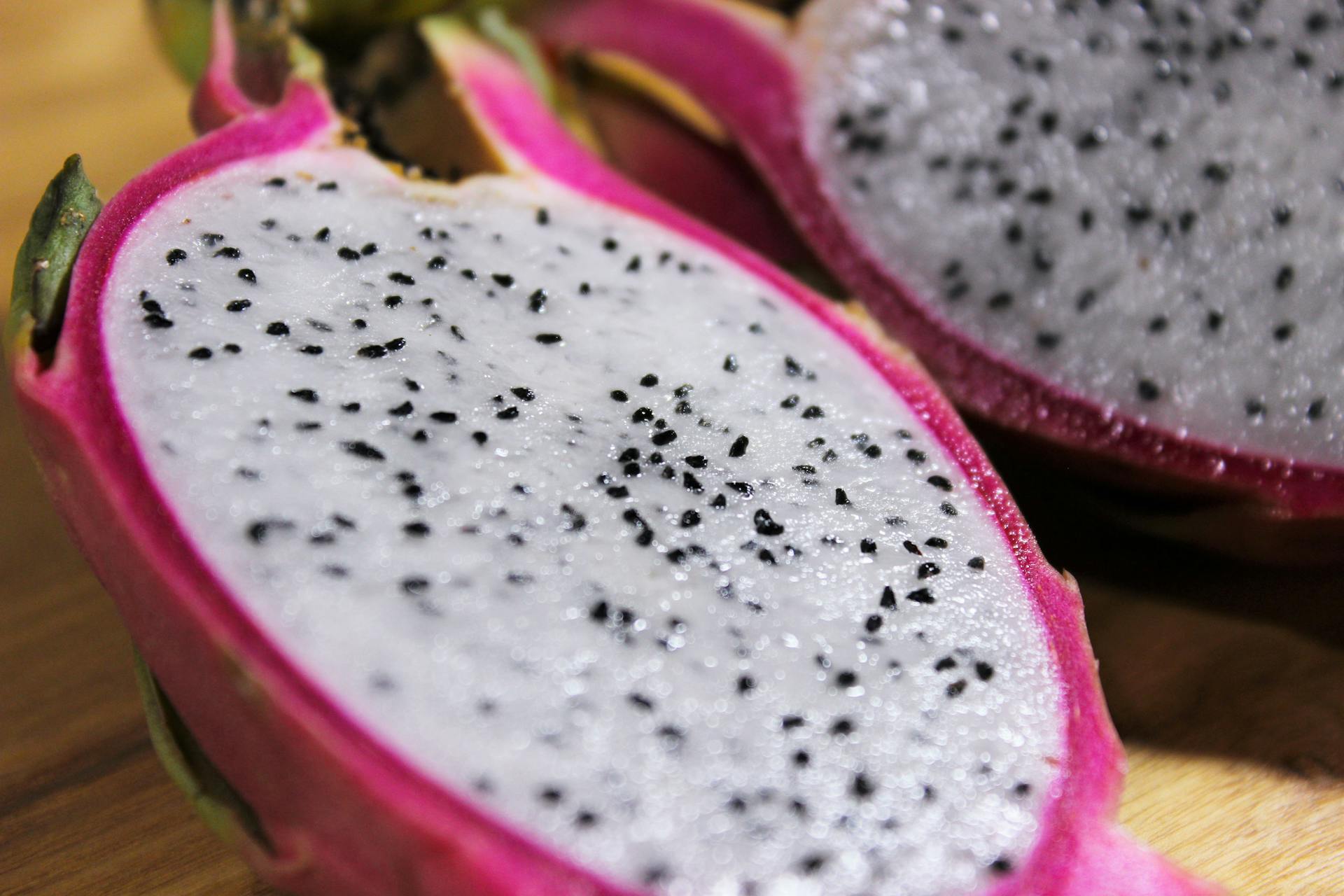
Dragon fruit, also known as pitaya, is a tropical fruit that has become increasingly popular in recent years. People primarily enjoy dragon fruit for its unique taste and vibrant appearance. Evidence suggests that this exotic fruit may not only be delicious but also provide health benefits.
This article takes an in-depth look at dragon fruit, including its nutrition benefits and potential health advantages. From its sweet and refreshing taste to its impressive nutrient profile, we will explore all that dragon fruit has to offer. Whether you're a fan of this exotic fruit or curious about trying it for the first time, read on to discover the wonders of dragon fruit!
Discover the Wonder of Dragon Fruit and Its Benefits!
Dragon fruit, also known as pitaya or pitahaya, is a tropical fruit native to Central America. The fruit grows on a type of cactus called hylocereus and has many names, including strawberry pear. Dragon fruit comes in two common types: one with bright red skin and green scales, white pulp, and black seeds; the other with yellow skin, white pulp, and black seeds. Regardless of its appearance, dragon fruit is a slightly sweet cross between kiwi and pear.
The Honolulu Queen brought dragon fruit to Hawaii in the 1800s from southern Mexico. Today it grows in Central America and parts of Asia. The most common type has red pulp with black seeds inside the white pulp. However, a type with white pulp exists too. Dragon fruit is not only delicious but also contains many health benefits like improving heart health due to its high levels of antioxidants.
In conclusion, dragon fruit is an exotic tropical fruit that everyone should try at least once! With its unique appearance and taste combined with numerous benefits for your health, there’s no reason not to give it a chance. Whether you prefer the red or yellow variety, rest assured that this superfood will soon become your new favorite snack!
Discover the Promising Perks of Potential Health Benefits

Dragon fruit, also known as pitaya, is a tropical fruit that has been gaining popularity in recent years due to its potential health benefits. Animal studies suggest that dragon fruit's antioxidant content may help reduce insulin resistance and fatty liver in obese mice 11 12 13. Study mice that received dragon fruit juice while on a high-fat diet had lower blood sugar responses and liver enzyme markers significantly increased 15.
Dragon fruit is also rich in prebiotic fiber, which can feed beneficial bacteria in our gut, improving digestion and overall health. In one study rats with diabetes were treated with dragon fruit extract for four weeks, resulting in decreased free-radical damage and arterial stiffness compared to the control group 16.
Human studies are limited but show promising results regarding dragon fruit's potential to improve insulin resistance, liver fat, and heart health. So next time you see those bright pink or white varieties of dragon fruit at the grocery store or farmer's market, consider adding them to your diet to reap their beneficial effects17!
Discover the Endless Types of Dragon Fruit!
Dragon fruit is a tropical fruit that comes in many varieties. There are three main types of dragon fruit: hylocereus undatus pitaya blanca, hylocereus polyrhizus pitaya roja, and hylocereus guatemalensis pitaya amarilla. Each type has its own unique characteristics that make it stand out.
The first type, hylocereus undatus pitaya blanca, has a pinkish-red skin and white flesh with black seeds. It is the most common type of dragon fruit and is known for its mild taste and refreshing juiciness. The second type, hylocereus polyrhizus pitaya roja, has a reddish-purple skin and red flesh with black seeds. It has a more intense flavor than the first type and is often used in desserts or smoothies. The third type, hylocereus guatemalensis pitaya amarilla, has a yellow skin and white flesh with black seeds. It has a sweeter taste than the other two types and is often eaten on its own as a snack.
In addition to these three main types of dragon fruit, there are also many hybrid varieties that have been developed over the years. These include varieties with yellow skin and red or white flesh, as well as those with purple skin and white or red flesh. No matter what type of dragon fruit you try, you're sure to be impressed by its unique appearance and delicious taste!
Boost Your Health with an Array of Antioxidants
Dragon fruit, also known as pitaya, is a tropical fruit packed with antioxidants. Antioxidants are molecules that protect our cells against unstable molecules called free radicals. Free radicals can cause damage to our DNA and lead to chronic diseases and aging. The main antioxidants contained in dragon fruit pulp are betalains and hydroxycinnamates.
Red dragon fruit, known for its deep red pigments, contains betalains that can help protect bad LDL cholesterol from becoming damaged by free radicals. Some studies have even demonstrated anticancer activity in animal studies. Dragon fruit is part of a large diverse group of fruits that have been linked to reducing the risk of heart disease and promoting brain health.
A study compared the antioxidant properties of 17 tropical fruits and found that dragon fruit had the highest antioxidant capacity. In addition to its high antioxidant content, dragon fruit also contains fatty acids that can help protect against free radical damage. So next time you're looking for a tasty way to boost your health, consider adding some dragon fruit to your diet!
Discover the Taste of Dragon Fruit: Is it Sweet or Sour?
Dragon fruit's unique appearance may seem intimidating at first, with its spiky strangeness scaring some people off. However, if you give this exotic fruit a chance, you might just be surprised by its taste. When it comes to dragon fruit, the question on everyone's mind is whether it is sweet or sour.
While some people compare the taste of dragon fruit to that of kiwi or pear, others describe it as similar to a mild and slightly sweet melon. While there is no denying that dragon fruit has a unique flavor profile, most people prefer sweet-tasting fruits over sour ones. So, if you're wondering whether dragon fruit is sweet or sour, the answer is pretty simple – dragon fruit is mostly sweet! In fact, it's so tasty that there's a pretty good chance you'll fall in love with this tropical treat after just one bite.
Discover the Advantages of Consuming Dragon Fruit Today!
Dragon fruit, also known as pitaya, is a tropical fruit that has been gaining popularity in recent years. This unique-looking fruit offers potentially disease-fighting antioxidants and is rich in nutrients, making it an excellent addition to your regular diet. Consuming dragon fruit on a regular basis can have a positive influence on your health.
One of the main advantages of eating dragon fruit is its high antioxidant content. Antioxidants help protect your cells from damage caused by free radicals, which can lead to several diseases such as cancer and heart disease. Additionally, dragon fruit contains vitamin C, fiber, and other essential nutrients that support overall health. So why not give this superfood a try and reap the benefits?
1. Improves Cardiovascular Health
Dragon fruit is the perfect food to improve cardiovascular health. This edible fruit provides omega-9 fatty acids that help reduce total cholesterol levels including LDL bad cholesterol levels, thus reducing the risk of heart attack. By improving cardiovascular health and reducing plaque buildup, dragon fruit promotes healthy blood flow 6.
2. Supports Your Immune System
Dragon fruit is an exotic fruit that supports your immune system by fighting off foreign invaders like germs and free radicals. It contains antioxidants that neutralize unstable atoms, preventing cell damage and keeping your body healthy. With a strengthened immune system, you may find yourself less vulnerable to infections such as the common cold or other illnesses that can take advantage of a weakened immune system.
3. Aids Your Digestion
Dragon fruit is a tropical fruit that can aid your digestion due to its high dietary fiber content. Eating dragon fruit can promote healthy digestion and gut health in adults, especially for those who struggle with bowel regularity. In fact, just one dragon fruit contains about 10 percent of the daily recommended intake of fiber, which contributes to treating constipation. So why not add this delicious and nutritious fruit to your diet on day 9 of your quest for adequate dietary fiber?
Frequently Asked Questions
What are the health benefits of dragon fruit?
Dragon fruit is a low-calorie, nutrient-dense fruit that can help strengthen the immune system, improve digestion, and provide anti-inflammatory benefits. It's also rich in antioxidants, vitamin C, and fiber.
How does dragon fruit help in preventing and fighting cancer?
Dragon fruit contains antioxidants and phytochemicals that help prevent and fight cancer by neutralizing free radicals, reducing inflammation, and promoting cell death in cancer cells.
Is dragon fruit good for boosting immunity?
Dragon fruit contains vitamin C, which is known to help boost the immune system. However, it is not a cure-all and should be consumed as part of a balanced diet along with other immunity-boosting foods.
How do you eat dragon fruit?
To eat dragon fruit, first slice it in half and scoop out the flesh with a spoon. The flesh can be eaten alone or added to smoothies and salads for a sweet and refreshing flavor.
What are the nutritional benefits of dragon fruit?
Dragon fruit is a low-calorie fruit that is high in fiber and vitamin C. It also contains antioxidants that can help protect against disease and improve overall health.
Featured Images: pexels.com

